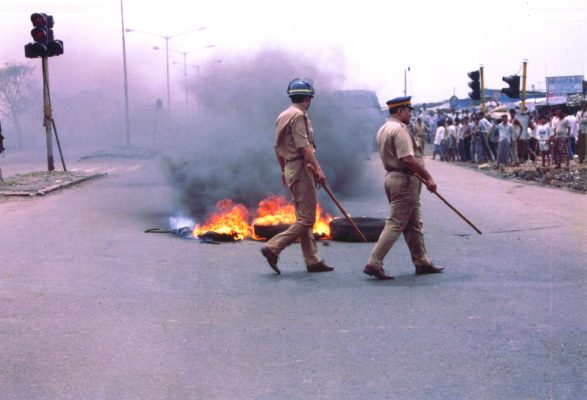CASTE AND CREDIT - THE JAI BHIM SAGA
Anand Patwardhans new documentary, 14 years in the making,is on the continuing struggle of the Dalit community in Maharashtra
By Jyoti Punwani

Garbage, slums, weather-beaten faces talking with pride and anger; above all full-throated songs recounting the life of Bhimrao Ambedkar and all the savagery his followers have faced since Independence in the progressive state of Maharashtra.These are the images that stay with you after watching Anand Patwardhan’s new documentary Jai Bhim Comrade, which has just got a censor certificate with no cuts.
Three and a half hours long and 14 years in the making, the film, which has already won the first prize at Kathmandus Film South Asia festival, looks at the world from the perspective of the Dalit as well as the perspective the other side has of the community.A youngster in a Barista outlet complains about how unqualified SCs (We hate them, says his female companion) get seats in colleges, making qualified ones wish they were backward too. Would you like to be a Dalit to get that seat asks Anand. No, replies the boy. Their thinking is low, they are dirty. They clean your filth, points out Anand. If thats the job they want, what can I do shrugs the youth.
A worker, ankle-deep in slime at Mumbais dumping ground (a recurring locale in the film, for its a Dalit workplace), lost an eye when his pitchfork hit him. Forget compensation, even a cap to protect his head from shit isn’t part of his contract.Nor is protective gear; the BMC challenged a high court order to provide 2,000 garbage workers on contract with gumboots, caps and raincoats.
The entire SC category is so dirty, you can make out even from far, shudders a Shivaji Park resident.Others complain about how they run, even as far as Dubai, when Dalit hordes descend on December 6 on the park to commemorate Ambedkar’s death anniversary.You cant compare it to the Ganesh festival, says another, when asked why no one objects to the 10-day mayhem that accompanies Maharashtra’s favourite festival.
Whose favourite Thats the question Anands film leaves you asking.I was born a Hindu, but I will not die a Hindu, sings Shahir Vithal Umap, one of the many Dalit singers whose songs run like a thread through the film. After our so-called independence, the 330 million Hindu gods didn’t get time to free 350 million of us from slavery, says Bhai Sangare, a founder of the Dalit Panthers. So what did we do Made Dr. Ambedkar a god and worshipped him.
Sangare mocks this culture of devotion, but when lullabies about Nandlal are replaced with those relating the message of Bhim (Ambedkar) and folk songs yearning for Kanha are cast aside for those about Ramabai Ambedkar yearning for her husband, one wonders whether such devotion should be mocked. The difference Ambedkar made to his followers comes out best through the words of a labourer whose daughter was raped by their Vanzara landlord: The Vanzaras call us lowcaste Mangs and we work on their fields; so we also think we are low-caste. No Buddhist follower of Ambedkar would say that.
The ability to look their upper-caste tormentors in the eye and reject them and all they stand for this quality marks Maharashtra’s Ambedkarite Dalits, shows the film.This is also the reason their torment continues be it Mumbai’s Ramabai Nagar in 1997, when 11 Dalits were shot dead by the police for protesting the desecration of their Ambedkar statue; or Khairlanji in 2006, when a Dalit mother, daughter and son were mutilated and killed by upper castes. The Sena-BJP was in power when the Ramabai Nagar firing took place; the Congress-NCP did all it could to protect sub-inspector Manohar Kadam, who ordered the firing. Yet, the end of the film shows the leaders of all these parties garlanding Ambedkar’s statue at Ramabai Nagar, welcomed by the once militant RPI leader Jogendra Kavade. It’s 2009; the cooption is complete; the residents weary, not even sure now who was in power when the firing took place.
The Ramabai Nagar firing led Marxist Dalit poet Vilas Ghogre to hang himself. This comrade died with a blue Jai Bhim headband on. Vilas had sung for Anands award-wininng Hamara Seher and his suicide prompted Anand to make Jai Film Comrade. The film took so long not only because I wanted to follow the Ramabai firing case;I also wanted to find out why Vilas killed himself. In doing so, Anand found himself following other Dalit musicians and the background that inspired them.The film ends with the talented young singers of Punes Kabir Kala Manch, who have had to go underground after the police labelled them Maoists for singing about the powerlessness of the Constitution to help them.
Of course the police do nothing when Bal Thackeray says human rights activists should be shot with sten guns; when Narendra Modi, sudarshan chakra revolving around his finger, says terrorists must be answered in kind; when Marathas tell their followers they can set their enemies on fire.The film records all these gems.But the best of them all A young Chitpavan telling Anand at a Brahmin rally: Theres a speciality in our genes; we have the genetic capacity to solve the worlds problems.